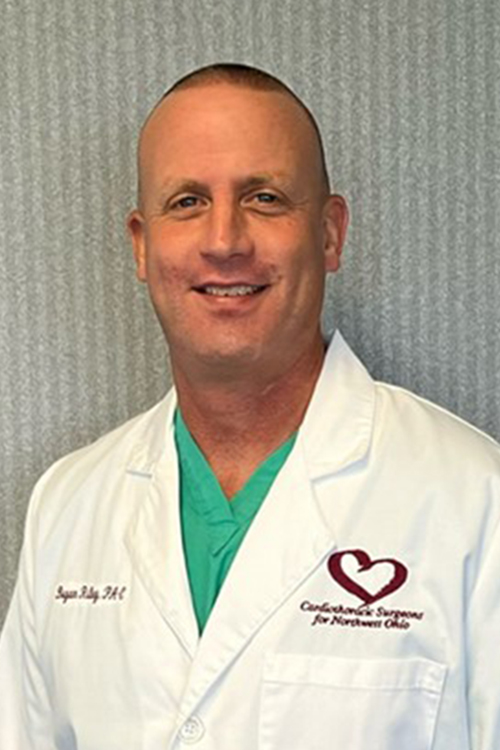Strategies for Optimal Endoscopic Vessel Harvesting (EVH) Preparation

Bryan Riley lives in Sylvania, Ohio, and is employed as a PA-C at Promedica Toledo Hospital. His educational background includes a Master’s Degree in Physician Assistant Studies. Bryan has worked in CV surgery for 20 years. He says he enjoys the variety of cases seen in the CVOR, and he values the responsibility and independence PA-Cs have. For Bryan, the most interesting cases are those that initially seem straightforward but then end up being a challenge. He says that solving the issue and then having a successful outcome is a valuable learning experience. Bryan says the most rewarding cases are those where he sees a new harvester gain confidence and then successfully complete a case on their own.

Tate Perque lives and works in Shreveport, Louisiana, where he is employed at Christus Highland Hospital. He is a 2010 graduate of LSUHSC - Shreveport. His credentials include being a Certified Physician Assistant (PA-C) with a Certificate of Added Qualification and Cardiovascular and Thoracic Surgery (CAQ CVTS). With over 14 years of CV surgery experience, he estimates having successfully completed somewhere in the range of 3,000–4,000 EVH cases. Tate has always been immensely interested in the cardiovascular system, and says cardiac surgery is a specialty where he can positively impact patient care. His advice to beginning harvesters is to not become discouraged with a difficult case. Tate says that inevitably new harvesters will be met with challenging cases and should rely on their training to guide them in those instances.
- Video Transcription
-
How do team dynamics contribute to the success of an EVH (Endoscopic Vessel Harvesting) procedure?
Bryan Riley: "Team dynamics during a procedure are very important. As with any type of surgery, having a team involved is critical to success. Not one person can do it all alone. As far as vein harvesting, having staff and nurses in the room that can have equipment set up and ready for when you come in is a key factor. And also having nurses and staff that know how to hook up the equipment when you're ready to get started and get things up on the screen. Just make the transition into harvesting very simple."
Tate Perque: "Team dynamics are one of the most important factors in any cardiac surgical case and that is also the case with an EVH procedure. I think ultimately the well-being of the patient is dependent upon a team approach like everybody in the room is involved with that and needs to be on the same page as a team. Whether it's the surgeon, the PA or harvester, circulating nurses, everybody has to be on the same page. For instance, if the PA or harvester is not involved with the prepping or draping of the patient, then those who are prepping and draping need to be mindful of what needs to be exposed so that gives the harvester the opportunity to successfully complete the procedure. The harvester needs to trust that the circulating staff have all the equipment available. It's working appropriately. The grounding pads are on, the foot pedals available. The cautery settings are appropriate. I think one of the most important factors is that the harvester needs to have an open and constant dialogue with the surgeon so that the surgeon knows how much available adequate conduit is there and able to be harvested. If there's inadequate amount of conduit, then you know, perhaps additional techniques need to be considered such as multi arterial harvesting or alternative grafting strategies. For me personally, what I try to do is take an approach of education and teaching to the staff so that they understand the how and the why of why we do things and that we put in a better position moving forward to remember and and work together as a team so that we can successfully complete the procedure."
What important factors do you take into consideration when evaluating patients for EVH?
Bryan Riley: "Probably the most important factor taken into consideration would be just making sure that the patient has vein in their leg that could be harvested. There's situations where a patient has had previous bypass surgery and most likely had been taken from one or both of their legs. Getting vein mapping prior to the operation is essential to just to ensure that you have vein to harvest. Another situation would be if somebody has had an amputation either on one leg or both legs. And again, that would be a situation where you want to get vein mapping to make sure they had viable vein left in the leg that they have."
Tate Perque: "I'd say one of the most important factors I take into consideration when endoscopic vein harvesting, especially in our older population is the presence of of prior surgery, specifically orthopeadic surgery. What I found over the years and patients who have prior orthopedic surgery and again specifically a knee replacement is that the vein quality and that side tends to be more suboptimal. So what I'll do is try to avoid that side of a leg that's been that's had a knee replacement if possible."
What is your advice for addressing challenges during an EVH procedure?
Bryan Riley: "During challenges, during a procedure, I think the most important thing is to remain calm and to think clearly. If you're at a point where you're stuck, then, you know, saying something to the surgeon like, hey, I'm having a problem down here. He or she may be able to give you some advice or a helpful hand. Another option would be if you're in a situation where there's other Pas in your group, you know, just calling one of them into the room to take another look and get a fresh set of eyes could help maybe find a solution to the problem you're having."
Tate Perque: "My advice for addressing challenges in an EVH procedure and specific to beginning harvesters or inexperienced harvesters, is that there's a lot of peaks and valleys along the learning curve. Inevitably what happens is just as when you feel that you're getting the hang of it, you're going to be met with multiple challenging cases, and they tend to come in bunches. So those times it's easy to become stressed, panic, and that just tends to snowball and, get in the way of your ability to effective and safely complete the procedure. What I tell beginning harvesters, when they're met with those challenges, it's just to try to slow down, take a deep breath and rely back on the tenants of your training. I found that to be the case even in in my work experiences that when I met with difficult cases, it's best to just slow down, you know, and and not panic and just maintain a goal-oriented approach to making sure that I can complete the task successfully and safely."

